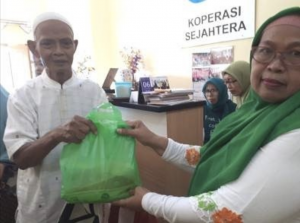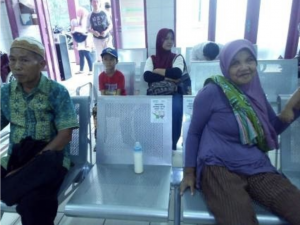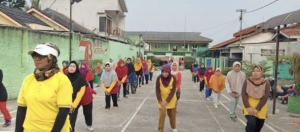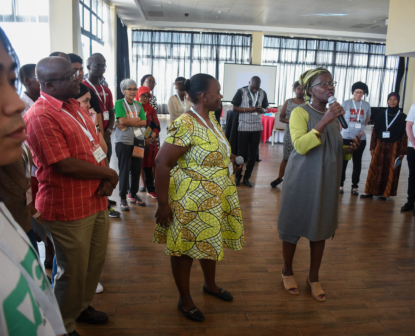Project
Taking care of each other! An elderly cooperative
-
Amount Funded
25,000 EUROProject Duration
01 Sep 2018 - 31 Aug 2019 -
-
Lead organisation
-
PPSW Jakarta is one of the women’s organisations in Indonesia that has consistently developed and assisted women’s groups since its founding in 1986 until today. The objectives of PPSW Jakarta are women’s empowerment and social transformation for women’s status and role in society through improving women’s access and control over equitable resources and gender equality. In the economic and social empowerment of women PPSW Jakarta has successfully developed 21 groups / cooperatives of women which until December 2016 have: (a) Total deposits Rp 30.011.678.142 (b) Loans Rp 70.885.608.825 (c) Total assets Rp 44.569.405.269 (D) Number of members 17,244 persons (d) Number of cadres 682 persons. The results of a study conducted by PPSW Jakarta in collaboration with CAS UI: 40% of PPSW assisted members in Jakarta are over 50 years old, 58% of members are on average graduated from elementary – junior high school, 32% have no job or as housewives and 23% as traders. Almost all members (92%) work in the informal sector who do not have retirement, even 90% do not know and do not have old-age planning, and do not have knowledge about humanity. To address this problem, PPSW Jakarta since 2012 has conducted Financial Education to 1,134 assisted members with the aim of providing knowledge and awareness about humanity, and providing information on the importance of financial planning for mature women (40+), in order to have preparation for planning of old age with a happy, prosperous and independent life. Through Education Programme, PPSW Jakarta has experienced working with women of mature age (ages 40+) to the elderly. PPSW Jakarta has a strategic programme (for every three years) and an annual plan.The planning of the PPSW Jakarta programme is arranged in a bottom up approach and begins with the planning process from below, by facilitating female institutions (cooperatives).
-
Organisation
PPSW Jakarta is one of the women’s organisations in Indonesia that has consistently developed and assisted women’s groups since its founding in 1986 until today. The objectives of PPSW Jakarta are women’s empowerment and social transformation for women’s status and role in society through improving women’s access and control over equitable resources and gender equality. In the economic and social empowerment of women PPSW Jakarta has successfully developed 21 groups / cooperatives of women which until December 2016 have: (a) Total deposits Rp 30.011.678.142 (b) Loans Rp 70.885.608.825 (c) Total assets Rp 44.569.405.269 (D) Number of members 17,244 persons (d) Number of cadres 682 persons. The results of a study conducted by PPSW Jakarta in collaboration with CAS UI: 40% of PPSW assisted members in Jakarta are over 50 years old, 58% of members are on average graduated from elementary – junior high school, 32% have no job or as housewives and 23% as traders. Almost all members (92%) work in the informal sector who do not have retirement, even 90% do not know and do not have old-age planning, and do not have knowledge about humanity. To address this problem, PPSW Jakarta since 2012 has conducted Financial Education to 1,134 assisted members with the aim of providing knowledge and awareness about humanity, and providing information on the importance of financial planning for mature women (40+), in order to have preparation for planning of old age with a happy, prosperous and independent life. Through Education Programme, PPSW Jakarta has experienced working with women of mature age (ages 40+) to the elderly. PPSW Jakarta has a strategic programme (for every three years) and an annual plan.The planning of the PPSW Jakarta programme is arranged in a bottom up approach and begins with the planning process from below, by facilitating female institutions (cooperatives).
-
Project
Dementia is one of the biggest problem faced by elderly in Indonesia, in addition to stigmatisation and discrimination. It is estimated that Indonesia has 1.2 million people with dementia and is included in the top ten countries with the highest dementia in the world by 2015. As a follow-up from their previous empowerment grant, Pusat Pengembangan Sumberdaya Wanita Jakarta (PPSW Jakarta) is implementing a project targeting elderly women in East and South Jakarta. The project “Taking care of each other: an elderly cooperative‘ aims to realise healthy, independent and productive elderly communities. It is an advanced stage programme -comprehensive in approach to prevent dementia and to prioritise elderly in public services. The overarching goal of the project is to improve the quality of life of elderly women. Specifically, it aims to: 1) establish the Cooperative-based “Elderly Care Model” that provides priority and special services for the elderly; 2) strengthen the Elderly Care leaders to establish the Cooperative-Based “Elderly Care Model”; 3) expand the access of elderly women to social protection of the Old Day Fund (DHT) and DASIMA and prevention of dementia; 4) facilitate access to health services and adminduk (population administration) for elderly through priority services in urban villages and community health centres; and 5) increase public awareness, elderly women and women leaders in dementia prevention, and prioritising elderly care services. To achieve these objectives, PPSW Jakarta conducts the following activities: 1) establish the Cooperative-based “Elderly Care Model”; 2) education and learning activities for Elderly Care leaders; 3) expand access to social protection and dementia prevention; 4) facilitate elderly women to gain access to health services and legal identity through priority services in urban villages and community centres; and 5) conduct public campaigns in dementia prevention and reduction of stigma and discrimination towards elderly women. Monitoring is done once in three months and evaluation at the end of the program.
-
-
Dementia is one of the biggest problem faced by elderly in Indonesia, in addition to stigmatisation and discrimination. It is estimated that Indonesia has 1.2 million people with dementia and is included in the top ten countries with the highest dementia in the world by 2015. As a follow-up from their previous empowerment grant, Pusat Pengembangan Sumberdaya Wanita Jakarta (PPSW Jakarta) is implementing a project targeting elderly women in East and South Jakarta. The project “Taking care of each other: an elderly cooperative‘ aims to realise healthy, independent and productive elderly communities. It is an advanced stage programme -comprehensive in approach to prevent dementia and to prioritise elderly in public services. The overarching goal of the project is to improve the quality of life of elderly women. Specifically, it aims to: 1) establish the Cooperative-based “Elderly Care Model” that provides priority and special services for the elderly; 2) strengthen the Elderly Care leaders to establish the Cooperative-Based “Elderly Care Model”; 3) expand the access of elderly women to social protection of the Old Day Fund (DHT) and DASIMA and prevention of dementia; 4) facilitate access to health services and adminduk (population administration) for elderly through priority services in urban villages and community health centres; and 5) increase public awareness, elderly women and women leaders in dementia prevention, and prioritising elderly care services. To achieve these objectives, PPSW Jakarta conducts the following activities: 1) establish the Cooperative-based “Elderly Care Model”; 2) education and learning activities for Elderly Care leaders; 3) expand access to social protection and dementia prevention; 4) facilitate elderly women to gain access to health services and legal identity through priority services in urban villages and community centres; and 5) conduct public campaigns in dementia prevention and reduction of stigma and discrimination towards elderly women. Monitoring is done once in three months and evaluation at the end of the program.
-
“Caring for the elderly through a family approach.”

PPSW Jakarta used these lines as the focus of their door to door sticker campaign. It aimed to change perceptions of the elderly, from being seen as a burden to their families to being “healthy, productive, and independent”. These lines also embodied their approach towards Voice’s support. Over the course of 12 months, PPSW Jakarta has:
- Supported 1,114 elderly women to contribute 141,410,219 IDR (approx. 8,750 EUR) to an Old Age Fund through three cooperatives, which they can access during their retirement;
- Supported 613 elderly women to contribute 18,597,730 IDR (approx. 1,150 EUR) to a Joint Risk Fund, which they can access during times of great need; and
- Facilitated 279 elderly women’s access to their community Elderly Care Centres, which provides various social services such as health and financial education.
These achievements would not have happened without an empowerment and influencing process of the elderly women themselves. Through the project:
- 20 elderly women were trained to be community leaders to coordinate and lead activities at the Centres as well as encourage other elderly women to go for health checks; and
- 25 – 60 elderly women attended consultation meetings with their provincial health offices, provincial social offices, community centres, and other government agencies to successfully influence them in developing and providing elderly-friendly services (e.g. health care provisions, activity rooms, mobility-friendly offices).
Awareness-raising also played a significant part in the project. Apart from the sticker campaign, PPSW Jakarta held an Elderly Festival, which gathered elderly women and key stakeholders to amplify their campaign. Social media also became a platform for the organisation to provide regular updates on their activities, from community health exercises to meetings with relevant community service providers. Through their activities and success, the women grew confident to continue building their own communities with other elderly women, be more involved in the cooperatives and elderly care centres, and demand the social services they need.
 There is still much work to be done, however. PPSW Jakarta and the women leaders said the impacts of the campaign remains limited. More awareness-raising needs to happen among family members to change their perceptions of the elderly as unproductive. Lastly, not everyone who participated in the project lives close to the elderly-friendly services that their local governments offer. There is a need to influence local authorities on how to bring these services closer to their homes.
There is still much work to be done, however. PPSW Jakarta and the women leaders said the impacts of the campaign remains limited. More awareness-raising needs to happen among family members to change their perceptions of the elderly as unproductive. Lastly, not everyone who participated in the project lives close to the elderly-friendly services that their local governments offer. There is a need to influence local authorities on how to bring these services closer to their homes.XXX
In addition to stigma and discrimination, one of the biggest challenges facing elderly people is dementia. Indonesia has an estimated 1.2 million cases of people suffering from dementia to the extent that in 2015 the country is included in the top ten countries with the highest dementia cases in the world. Since its founding in 1986, PPSW Jakarta is one of the women’s organizations in Indonesia that has consistently developed and assisted women’s groups. The objectives of PPSW Jakarta are women’s empowerment and social transformation of women’s status and role in society by improving women’s access, and control over equitable resources and gender equality. In the area of economic and social empowerment of women PPSW Jakarta, up to December 2017, had succeeded in developing 21 women’s groups/cooperatives that have (a) total deposits of Rp 45,502,474,206 (b) total loans Rp 107.276.696.636 (c) total assets Rp 67,537,165,432 (d) 20,837 members (d) 1,008 cadres, through its community organizing strategy. Since 2017, PPSW Jakarta has implemented a project for elderly women titled, “Women’s Leadership for easy social security access for elderly women through Elderly Care Center in DKI Jakarta”. PPSW Jakarta aimed to focus on elderly women in East and South Jakarta by strengthening the elderly care centre that has been successfully built from the first stage of the project. The project established a “model” Elderly Care Center with a more comprehensive approach for the prevention of dementia and provision of public services that prioritise the elderly. Specifically, the project sought to improve the quality of life of the elderly women, strengthen women leaders at the grassroots level, improve quality of care for the elderly, empower elderly women for the prevention of dementia, facilitate their access to health services and legal identity through priority services in Urban Village and Puskesmas (community health clinics) and finally, increase public awareness among elderly women and women leaders to prevent dementia and provision of priority services for the elderly. Through the Programme for Elderly Women, 3 Elderly Care Centers have been established in 3 cooperatives in South Jakarta and East Jakarta, to provide knowledge, new awareness and skills to 171 elderly women. The program also aims to enable access to health services for 223 elderly women through synergy with 2 posyandu (integrated service post) and 5 posbindu (integrated health post). There has also been an increase in the savings of the Old Day Fund (DHT) in 3 cooperatives serving women and patronized by 172 elderly savers with the amount of Rp 115,007,052 as a form of social protection that can be used when needed. The programme has also given new life and spirit to the elderly cadres who feel needed, useful and valued again. The programme aims to ensure that the elderly do not become a burden to others. There were 312 elderly women rightsholders participating in the project. Every month a mentoring of The Elderly Care Centre Model was carried out. The activities were carried out via house-to-house visits to the elderly members and families while re-enlisting additional elderly members. Activities included motivating the ailing elderly to see a doctor and maintain their health. It also included encouraging them to save their money in cooperatives, visit the urban villages to build synergies and cooperation and visit DKI Jakarta Provincial Health Office and the South Jakarta Elderly Health Service to convey the development of activities at the Elderly Care Center as well as campaign on priority services for the elderly. With the existence of physical activity or elderly gymnastics, elderly mothers felt the benefits. They became increasingly keen to maintain their health, and have the opportunity to meet and share stories with the other elderly mothers. Even younger community members participated in gymnastics. Participating in the gymnastics created a bond among the community. As a result of discussions on health issues and prevention of dementia, elderly members were motivated to take care of their health. They were sensitized on organizing a healthy life, age-appropriate diet, adequate rest, and to regularly attend gymnastic with the elderly cadre. There was an increase in enthusiasm to continue to actively run businesses, social and religious activities, recreation, and establish communication and kinship with fellow elderly families. Through discussion and question and answer sessions on the prevention of dementia, the elders were motivated to reduce the risk of developing dementia, or to slow down the onset through the varied activities. Attention and support was demonstrated by the cadres during the visit to the elderly families so that they were more concerned about caring for the elderly through activities such as daily care, creating a healthy environment, routine communication with family as well through creation of opportunities to meet with relatives and participate in other activities that make the elderly remain productive and happy. The project also inspired some changes to be made in public facilities, for example, mounted iron handles in the bathroom/toilets were installed to make it easier for the elderly to use the facilities even though there is no anti-slip carpet. The community health centre also made a special room for counselling and other activities. One of the ways to raise public awareness was by making stickers that read, “Prioritize Services for the elderly” and “Refuse Senility”. 500 stickers were produced. The purpose of making the stickers was to campaign for priority services for the elderly when accessing services in cooperatives, urban villages, and community health centres and the other public places. The project has definitely gone a long way in creating some tangible benefits for the elderly populations of Jakarta through a series of activities that are not only sustainable, but are designed to create long term positive impacts.



-
News

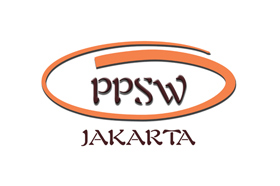
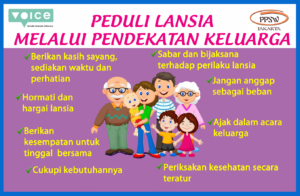
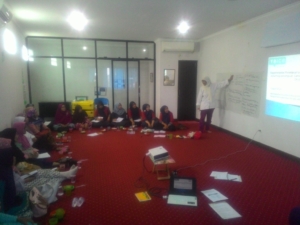 There is still much work to be done, however. PPSW Jakarta and the women leaders said the impacts of the campaign remains limited. More awareness-raising needs to happen among family members to change their perceptions of the elderly as unproductive. Lastly, not everyone who participated in the project lives close to the elderly-friendly services that their local governments offer. There is a need to influence local authorities on how to bring these services closer to their homes.
There is still much work to be done, however. PPSW Jakarta and the women leaders said the impacts of the campaign remains limited. More awareness-raising needs to happen among family members to change their perceptions of the elderly as unproductive. Lastly, not everyone who participated in the project lives close to the elderly-friendly services that their local governments offer. There is a need to influence local authorities on how to bring these services closer to their homes.